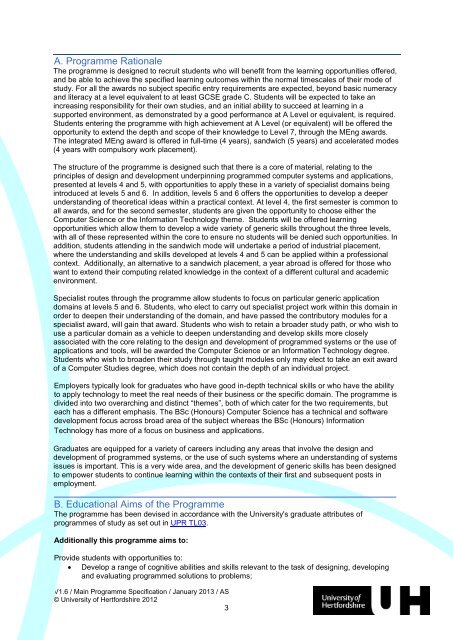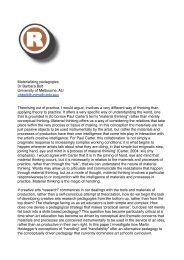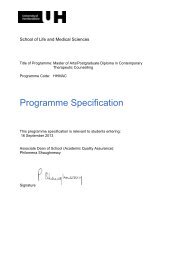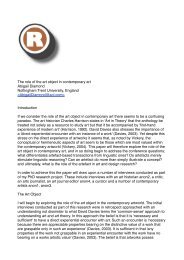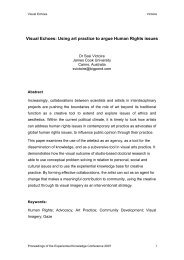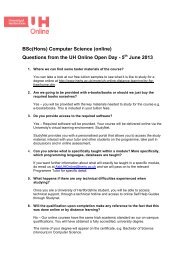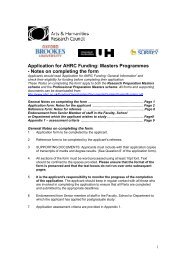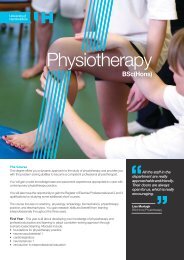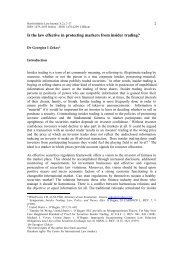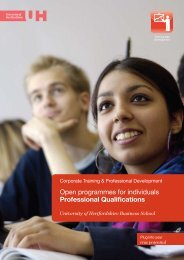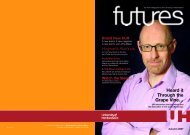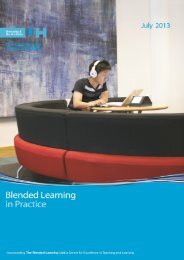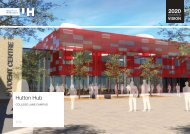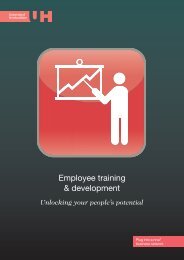Programme specification (pdf) - University of Hertfordshire
Programme specification (pdf) - University of Hertfordshire
Programme specification (pdf) - University of Hertfordshire
You also want an ePaper? Increase the reach of your titles
YUMPU automatically turns print PDFs into web optimized ePapers that Google loves.
A. <strong>Programme</strong> Rationale<br />
The programme is designed to recruit students who will benefit from the learning opportunities <strong>of</strong>fered,<br />
and be able to achieve the specified learning outcomes within the normal timescales <strong>of</strong> their mode <strong>of</strong><br />
study. For all the awards no subject specific entry requirements are expected, beyond basic numeracy<br />
and literacy at a level equivalent to at least GCSE grade C. Students will be expected to take an<br />
increasing responsibility for their own studies, and an initial ability to succeed at learning in a<br />
supported environment, as demonstrated by a good performance at A Level or equivalent, is required.<br />
Students entering the programme with high achievement at A Level (or equivalent) will be <strong>of</strong>fered the<br />
opportunity to extend the depth and scope <strong>of</strong> their knowledge to Level 7, through the MEng awards.<br />
The integrated MEng award is <strong>of</strong>fered in full-time (4 years), sandwich (5 years) and accelerated modes<br />
(4 years with compulsory work placement).<br />
The structure <strong>of</strong> the programme is designed such that there is a core <strong>of</strong> material, relating to the<br />
principles <strong>of</strong> design and development underpinning programmed computer systems and applications,<br />
presented at levels 4 and 5, with opportunities to apply these in a variety <strong>of</strong> specialist domains being<br />
introduced at levels 5 and 6. In addition, levels 5 and 6 <strong>of</strong>fers the opportunities to develop a deeper<br />
understanding <strong>of</strong> theoretical ideas within a practical context. At level 4, the first semester is common to<br />
all awards, and for the second semester, students are given the opportunity to choose either the<br />
Computer Science or the Information Technology theme. Students will be <strong>of</strong>fered learning<br />
opportunities which allow them to develop a wide variety <strong>of</strong> generic skills throughout the three levels,<br />
with all <strong>of</strong> these represented within the core to ensure no students will be denied such opportunities. In<br />
addition, students attending in the sandwich mode will undertake a period <strong>of</strong> industrial placement,<br />
where the understanding and skills developed at levels 4 and 5 can be applied within a pr<strong>of</strong>essional<br />
context. Additionally, an alternative to a sandwich placement, a year abroad is <strong>of</strong>fered for those who<br />
want to extend their computing related knowledge in the context <strong>of</strong> a different cultural and academic<br />
environment.<br />
Specialist routes through the programme allow students to focus on particular generic application<br />
domains at levels 5 and 6. Students, who elect to carry out specialist project work within this domain in<br />
order to deepen their understanding <strong>of</strong> the domain, and have passed the contributory modules for a<br />
specialist award, will gain that award. Students who wish to retain a broader study path, or who wish to<br />
use a particular domain as a vehicle to deepen understanding and develop skills more closely<br />
associated with the core relating to the design and development <strong>of</strong> programmed systems or the use <strong>of</strong><br />
applications and tools, will be awarded the Computer Science or an Information Technology degree.<br />
Students who wish to broaden their study through taught modules only may elect to take an exit award<br />
<strong>of</strong> a Computer Studies degree, which does not contain the depth <strong>of</strong> an individual project.<br />
Employers typically look for graduates who have good in-depth technical skills or who have the ability<br />
to apply technology to meet the real needs <strong>of</strong> their business or the specific domain. The programme is<br />
divided into two overarching and distinct “themes”, both <strong>of</strong> which cater for the two requirements, but<br />
each has a different emphasis. The BSc (Honours) Computer Science has a technical and s<strong>of</strong>tware<br />
development focus across broad area <strong>of</strong> the subject whereas the BSc (Honours) Information<br />
Technology has more <strong>of</strong> a focus on business and applications.<br />
Graduates are equipped for a variety <strong>of</strong> careers including any areas that involve the design and<br />
development <strong>of</strong> programmed systems, or the use <strong>of</strong> such systems where an understanding <strong>of</strong> systems<br />
issues is important. This is a very wide area, and the development <strong>of</strong> generic skills has been designed<br />
to empower students to continue learning within the contexts <strong>of</strong> their first and subsequent posts in<br />
employment.<br />
B. Educational Aims <strong>of</strong> the <strong>Programme</strong><br />
The programme has been devised in accordance with the <strong>University</strong>'s graduate attributes <strong>of</strong><br />
programmes <strong>of</strong> study as set out in UPR TL03.<br />
Additionally this programme aims to:<br />
Provide students with opportunities to:<br />
Develop a range <strong>of</strong> cognitive abilities and skills relevant to the task <strong>of</strong> designing, developing<br />
and evaluating programmed solutions to problems;<br />
V1.6 / Main <strong>Programme</strong> Specification / January 2013 / AS<br />
© <strong>University</strong> <strong>of</strong> <strong>Hertfordshire</strong> 2012<br />
3


